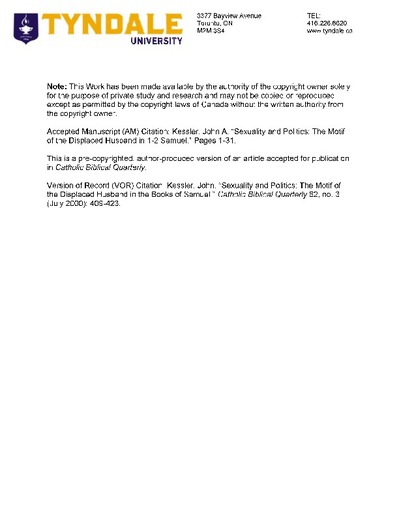| dc.rights.license | Attribution-NonCommercial-NoDerivatives 4.0 International License | en_US |
| dc.contributor.author | Kessler, John, 1951-2023 | |
| dc.date.accessioned | 2021-11-16T16:54:24Z | |
| dc.date.available | 2021-11-16T16:54:24Z | |
| dc.date.copyright | 2000-07 | |
| dc.date.issued | 2000-07 | |
| dc.identifier.citation | Accepted Manuscript (AM) Citation: Kessler, John A. “Sexuality and Politics: The Motif of the Displaced Husband in 1-2 Samuel.” Pages 1-31. | en_US |
| dc.identifier.issn | 2163-2529 | en_US |
| dc.identifier.uri | https://digitalcollections.tyndale.ca/handle/20.500.12730/1095 | |
| dc.description.abstract | In 1-2 Samuel, three of David’s marriages involve the displacement of the male protagonist and the subsequent appropriation of the latter’s wife. This study (1) traces the dramatic progression in these three “displacement accounts” (1 Sam 25; 2 Sam 3: 1-16; 2 Sam 11-12) and (2) discusses their narrative and theological function. A clear dramatic progression emerges via each account’s characterization of David, of the displaced husband, and of the ambiance of the ruptured marriage. In 1 Sam 25 David acts honourably, the dissolved marriage is negatively portrayed, and the displaced male is vilified. 2 Sam 3: 116 is more critical of David. David who has six other wives, acts from political motives, and occasions great sorrow and humiliation for the male protagonist, for whom the termination of the marriage represents great loss. Significant parallels exist between the humiliation of Paltiel and Tamar. In 2 Sam 11-12, David is vilified, the male protagonist is idealized and the former conjugal relationship is portrayed as intimate and warm. When read together, these three accounts, despite their disparate origins, relate to three broader theological preoccupations in the Deuteronomistic History. (1) The narratives reflect deuteronomistic anti-monarchical sentiment, specifically in relation to royal polygamy. (2) The narratives manifest two competing views of marriage and sexuality. One view sees them as a means of defining political status, akin to the instances in Samuel-Kings where individuals display their superiority through the sexual appropriation of their rivals’ wives. The other views them as a locus of nurture and attachment. Given that the text associates both visions with YHWH, hermeneutical reflection is required to determine whether one or the other is affirmed or critiqued. (3) The narratives portray an individual who sins grievously against YHWH, yet is allowed to live, albeit under judgment. Such a perspective would be particularly apposite for an exilic audience. | en_US |
| dc.format.mimetype | application/pdf/ua | en_US |
| dc.language.iso | en | en_US |
| dc.publisher | Catholic Biblical Association of America | en_US |
| dc.rights | Copyright, John Kessler. All rights reserved. | en_US |
| dc.rights.uri | https://creativecommons.org/licenses/by-nc-nd/4.0/ | en_US |
| dc.subject.lcsh | Sexuality | en_US |
| dc.subject.lcsh | Politics | en_US |
| dc.subject.lcsh | Marriage | en_US |
| dc.subject.lcsh | David, King of Israel | en_US |
| dc.subject.lcsh | Bible. Samuel | en_US |
| dc.subject.lcsh | Abigail (Biblical figure) | en_US |
| dc.subject.lcsh | Nabal (Biblical figure) | en_US |
| dc.subject.lcsh | Michal (Biblical figure) | en_US |
| dc.subject.lcsh | Paltiel (Biblical figure) | en_US |
| dc.subject.lcsh | Bathsheba (Biblical figure) | en_US |
| dc.subject.lcsh | Uriah (Biblical figure) | en_US |
| dc.title | Sexuality and Politics: The Motif of the Displaced Husband in the Books of Samuel | en_US |
| dc.title.alternative | The Motif of the Displaced Husband in the Books of Samuel | en_US |
| dc.title.alternative | The Motif of the Displaced Husband in 1-2 Samuel | en_US |
| dc.type | Article | en_US |
| dc.contributor.affiliation | Tyndale University | en_US |
| dc.contributor.department | Seminary | en_US |
| dc.contributor.repository | Tyndale University, J. William Horsey Library, 3377 Bayview Ave., Toronto, ON, M2M 3S4, Canada. Contact: repository@tyndale.ca | en_US |
| dc.identifier.issue | no. 3 | en_US |
| dc.identifier.journal | Catholic Biblical Quarterly | en_US |
| dc.identifier.volume | 62 | en_US |
| dc.publisher.place | New York | en_US |
| dc.relation.isversion of | Version of Record (VOR) Citation: Kessler, John. “Sexuality and Politics: The Motif of the Displaced Husband in the Books of Samuel.” Catholic Biblical Quarterly 62, no. 3 (July 2000): 409-423. | en_US |
| dc.rights.holder | John Kessler, jkessler@tyndale.ca | en_US |
| dc.subject.keyword | Sexuality | en_US |
| dc.subject.keyword | Politics | en_US |
| dc.subject.keyword | Displaced husband | en_US |
| dc.subject.keyword | Marriage | en_US |
| dc.subject.keyword | David, King of Israel | en_US |
| dc.subject.keyword | Abigail (Biblical figure) | en_US |
| dc.subject.keyword | Nabal (Biblical figure) | en_US |
| dc.subject.keyword | Michal (Biblical figure) | en_US |
| dc.subject.keyword | Paltiel (Biblical figure) | en_US |
| dc.subject.keyword | Bathsheba (Biblical figure) | en_US |
| dc.subject.keyword | Uriah (Biblical figure) | en_US |
| dc.description.chapterpage | 1-31 | en_US |
| dc.description.note | For AODA accommodation, including help with reading this content, please contact repository@tyndale.ca | en_US |
| dc.description.version | Accepted manuscript | en_US |


